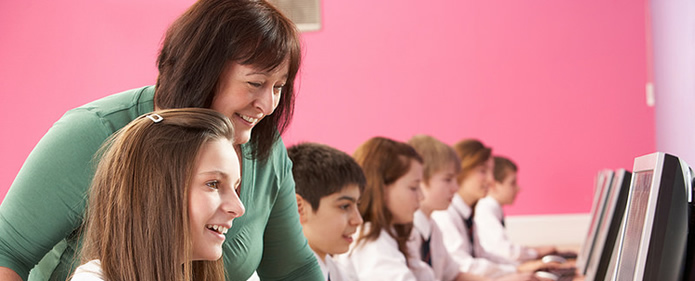
Helping St Ronan's College develop digital skills
St Ronan's College, a co-educational 11-18 voluntary grammar school in Northern Ireland, was awarded almost €90,000 in Erasmus+ funding to run a Key Action 2 Strategic Partnership for Schools project with partner schools in France, Italy, Germany, Greece and Austria.
Entitled ‘Innovative Digital European Active Learning’, their project helped staff and pupils develop digital skills to support both teaching and learning in the school's curriculum. The initial project work established a website to support communication and activity has focussed on students and staff working on three main areas:
- creating ‘Linguistic Skills’ blogs that helped students and staff develop their language skills;
- carrying out EU Citizenship tasks such as using digital technology and iPads to create iMovies about their schools and working on an oral history project that was recorded digitally. Project work also developed the innovative and digital creation of lesson plans and resources on a scheme of work about the EU;
- developing key digital skills in website creation, blog site creation and using tablets and iPads to improve standards of teaching and raise student attainment.
Staff activities
The learning, teaching and training activities were skills-focussed and used innovative teaching and learning strategies that helped to raise attainment. Staff were able to teach and job shadow their European partner staff and learn from best practice; with staff from Germany visiting St Ronan’s in April 2016 and in May 2016 staff from St Ronan’s visiting Austria. Staff training and development took place at each exchange meeting and covered topics such as using iPads to support active learning, using teaching Apps such as iDoceo and creating website and Apps. Digital Teaching Materials were built-up over the various tasks and were used to create eBooks and Apps on iBook Digital Teaching in ICT and Presentation Skills, Digital Teaching for Employability and Linguistic Skills.
Opportunities for students
All students participated in a foreign work experience project to boost employability and linguistic skills as well as develop a greater sense of European identity. The first long-term exchange saw students from Italy visiting the UK. Such long-term pupil placements equipped students with the skills and experience invaluable for university or working life, such as entrepreneurial skills and judgement, and help reduce the risk of youth unemployment.
Recording the evidence
All students and staff created their own European Skills Passport through Europass and updated it throughout the project. The passport was then used as evidence along with other project work to be accredited through ECVET (European Credit System for Vocational Education and Training). Participants wishing to build on their Erasmus+ experience and take a gap year working, volunteering or studying abroad, were encouraged to use ESCO, the multilingual classification of European skills, competences, qualifications and occupations services, to help them gain employment or a placement.
Making an impact
Evaluation results indicated a positive impact upon participants. This was seen through the increased use of ICT and digital resources in learning and teaching across the six schools. Many of the teachers went on to use Edmodo (a web-based platform that provides a safe and easy way for classes to connect and collaborate) to create Virtual Learning Environments for their courses. Students loved using tablets and iPads for project work and have transferred skills developed to other subjects. There has also been an impact on the school curriculum with the project being embedded into the timetable. The school also expects to see future changes to each school’s curriculum in bridging the skills gap that exists in some regions, through the forging of close business links established during the work experience element of their partnership. Many students and staff have commented on the future impact of travelling across Europe and seeking more opportunities to work and study in a partner school.
Erasmus+ is an opportunity to make a real difference to students through improving their employability skills and school-business links
The monthly amount awarded to organisations for project management and implementation allowed the school to purchase a website and web domain as well as relevant Apps and software. They were also able to use specialist training in the use of digital teaching and learning from AMMA specialists and iTeach professionals.
Making a difference
Northern Ireland Education Minister John O’Dowd met visiting European teachers and students at an Erasmus+ Exchange Assembly in St Ronan’s College while they were hosting 17 teachers and 17 students from France, Austria, Germany, Italy and Greece. At a special assembly at St Ronan’s College to welcome the visitors, he commented: "Erasmus+ is an opportunity to make a real difference to students through improving their employability skills and school-business links. Taking part in this project is an opportunity to develop skills such as problem solving and new languages and to collaborate with others in Europe. These next few days are a fantastic opportunity to actually meet and learn from counterparts in Europe. Although we may speak different languages we all share a common European identity. I hope this project continues to be a positive influence on the learning across this school and across all schools with whom you are partnered."
Taking part in this project is an opportunity to develop skills such as problem solving and new languages and to collaborate with others in Europe
Want to read more about Erasmus+ schools experiences? Visit our dedicated webpage!

Add new comment